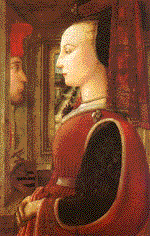Men and Women
"If it were not that I am at the mercy of the shrewdest of your relatives..."It is not only the masculine protagonists who know how the game is played; here the women are equal to the men, and sometimes even superior.
Johnnie Bullo in "Game of Kings" pt. III, ch. 2
 |
What Janet hatches out behind her husband's back, what Christian knows and conceals, the men are the last to discover. Dunnett's women stand self-confidently vis-à-vis men. Marian carries on her first husband's business after his death and even expands it.
Gelis challenges Nicholas to a duel for the survival or collapse of a business empire, and in so doing fights for recognition and equality.
"What do men talk about?" asks Mariotta in Game of Kings, and begins a challenging dialogue with Richard, who almost wrecks his marriage by his failure to comprehend that men and women could actually have equal rights as (conversational) partners.
Not one of Dunnett's women is stupid, predictable, or two-dimensional. And where Dunnett does employ clichés, she makes them so strongly ironic that in the end our sympathy is once again on the woman's side.
Agnes Herries, her head full of chivalric romances, gets what she dreams of, a romantic lover and the husband she wishes for. However much of a caricature she is in the beginning, her final appearance in Game of Kings shows that Agnes is more than just a silly romantic goose.
 |
Dunnett's heroes are plagued by neuroses and traumatic experiences. They have complex and difficult relationships to women, and especially to their mothers. Women remain the driving force in their lives, and the tool women use to gain a hold on men is manipulation. And what could represent it better than the dark joke Dunnett allows herself with her readers in the Lymond Chronicles? The Dame de Doubtance, who shares the author's initials not just by chance, manipulates the Crawford family's fate behind the scenes like a spider spinning her web. None of the protagonists escapes her schemes, and in the end her presence is felt even from beyond the grave.
"Do you think I bring any child into the world to live for himself alone?" Sybilla demands of her son in "Checkmate" (pt. V, ch. 8), forcing him into responsibility and back into life. That's how it is with Dunnett. In the end the men, none of them fairy-tale princes, need the women more than vice versa. Dunnett's men fulfill almost every romantic topos, concerning themselves with birth, heritage, wealth and success. Dunnett's women fulfill not a single one; what concerns them is independence.